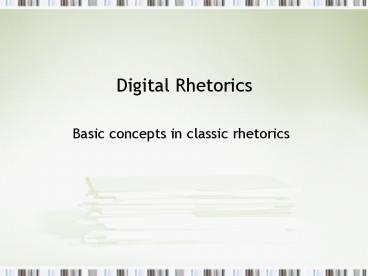Digital Rhetorics - PowerPoint PPT Presentation
1 / 16
Title:
Digital Rhetorics
Description:
First day you need to have read in it: 29 sept. Slides up before ... Empty decoration (Rhetoric is always meta, active, interested in effect, social, affective) ... – PowerPoint PPT presentation
Number of Views:59
Avg rating:3.0/5.0
Title: Digital Rhetorics
1
Digital Rhetorics
- Basic concepts in classic rhetorics
2
todays menu
- Last weeks results topics for course
- Practical info kompendium
- What is rhetorics? Today as our basic template
- Your web research (all)
- Covinos paper (ST)
- Next week
3
Possible topics, objects or aspects
7
- Structure hypertext and argumentation
- Structure distributed and fragmented narratives
- Pathos in digital media (f.e. Storytelling to get
message across) - Discourses about digital media
- Mobile rhetorics
- Software rhetorics
- Gameplay rhetorics
- The visual!!!!!!!
- Sound
- Cross Media rhetorics
- Ethos in digital media
- Rhetorical invention (i.e. Ulmer)
- Machinima
- Storytelling in digital media (narrative),
e-learning - Digital genres (different expectations, user
perspective) - Aiming messages to recipients, other kinds of
users
6
1
1
6
6 for exercises
2
8
7
5
1
2
2
2
5
1
Vote results
4
The course plan
- Work-in-progress
- Link in blog
- Readings Kompendium other texts, coming up
this week waiting for guests. First day you need
to have read in it 29 sept. - Slides up before class, same morning!
- Who presents texts next week?
http//ddrtE06.blogspot.com/
5
What is rhetoric?
Your research?
Dame Rhetoric
6
What is rhetoric?
- Follows Covino and Jolliffes paper (in komp.)
- Myriad of interpretations
- Rules as to how language works
- Persuasion
- Embellishment
- Fraud, vilification of rhetoric, opposite of
truth - Emotional energy...
- Rhetorics is not a content area, but rather the
study and practice of shaping content (thus any
area, ex of New Criticism vs. Deconstruction)
7
A definition
Rhetoric is a primarily verbal, situationally
contingent, epistemic art that is both
philosophical and practical and gives rise to
potentially active texts.
- We understand text in a broad way
- Participants rhetor and auditors/audience
- Potentially active rhetor intends to do
something, affect or change - Primarily verbal act (but we adapt)
- Situationally contingent kairos
- Philosophical rhetoric is the exploratory
construction of knowledge (ex. dialectical as
Plato or topical (strategies such as comparison)
as in Aristotle. Foundation for inventio.
8
Rhetoric is not
- Truth (not absolute, at least)
- Logic (chain of reasoning, no incortrovertible
conclusions in rhetoric) - Dialectic (reasoning processes, but rhetoric also
sees how they are created and communicated) - Poetics (Looks at produced texts, rhetorics also
has tools to compose) - Empty decoration (Rhetoric is always meta,
active, interested in effect, social, affective)
9
Elements of Rhetoric
- They come from rhetorica docens (theory books)
and rhetorica utens (examples of practise)
The 5 canons
- Inventio
- Dispositio
- Elocutio
- Memoria
- Actio
Elements
- Rhetorical Situation
- Audience
- Pisteis
- Ethos
- Logos
- Pathos
10
Rhetorical Situation (Bitzer)
- An exigence, a gap, something calls for a text
(ex. Death for an eulogy, new discovery for a
scientific paper) - There are people with a reason to be concerned
about the exigence (an audience), with feelings
about it. - There are some rhetorical constraints knowledge
of the audience, beliefs, what fits the
situation, speakers reputation...
Vatz critique the 3 are not simply there, they
are also created by the rhetors who activate them
inscribing them into their texts.
11
Audience
- Primary/Immediate and Subsidiary/Mediated
- Classical view very one way, audience as passive
- Modern view from discourse community to active
audiences
12
Means of Persuasion
- Pisteis (pl)/Pistis (sg) proof, appeal
- Ethos (Character credibility of rhetor. In
Greek text must do the work. In Roman also
life, virtues. Ex. of how in text academic
papers with footnotes, bio info, affiliation...) - Pathos (Emotional appeal, beyond Aristotles
catalogue, he is ethically neutral about using
pathos later exigence tied to ethos) - Logos (Appeal to modes of reasoning convincing
for audience tools enthymeme and example)
13
A note on logos
- Logos does not function logically, but
rhetorically. Each element of the appeal, the
assumptions, the observation and the claim, may
be debatable and admit more than one
possibility. - The rhetor might miss the audience at any of
these three stages (ex. a political discussion on
inmigration, but it can also be on a scientific
discipline)
Enthymeme assumptions observation claims
Not silogism as in logic, verifiable
14
The Canons of Rhetoric
- Inventio (Generating material, techniques
specific to disciplines, ex. journalist
questions) - Dispositio (Arranging material, within genres of
discourse, ex. an academic paper) - Elocutio (Style, creates favourable impression.
Includes tropes (like metaphor) and schemes (like
parallelism) - Memoria (Residue of oral culture, palace, how to
find data database?) - Actio (Delivery, body, voice)
15
Final note on rhetorics
- The rhetoricizing of academic subjects that
were once regarded as objective, and whose
scholars regarded themselves as disinterested,
comes along with the postmodern recognition that
all discourse serves to advance certain
interests, certain versions of truth and facts
that serve individual and institutional biases
and motives.
16
For next week
- Read the two texts (a copy was given in class)
- Lanham. excerpt from The Electronic WordZappen.
Digital Rhetoric Toward an Integrated Theory - For the exercises we will work with digital
persuasion. The topic is political blogs. Check
out http//www.klastrup.dk/walgblog/ and read
about the project. Follow also some of the links
to politicians blogs or find your own political
blogs. You need to come to the exercise session
with an idea about it, take some notes as to how
they relate to the three pisteis. - Check out the blog (todays exercise ppts and
notes will be up, together with the lecture
slides)































